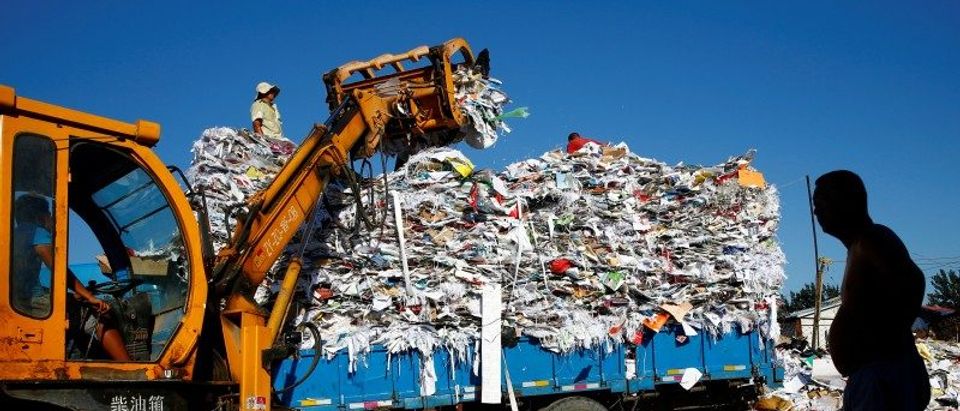As scattered voices have demonstrated for decades, the Recycling Empire has no clothes. Only aluminum recycling, they have shown, offers clear environmental and economic benefits. Despite persuasive exposés in The New York Times, The Washington Post, Fortune, and elsewhere, anti-recycling forces have done little more than feebly suggest we dump mandatory recycling.
That’s not enough.
It’s time for Americans who care about freedom, science, and yes, the health of the planet to sabotage recycling programs through citizen action.
The case against recycling has been made amply elsewhere, in plain sight (here’s Wikipedia). Before I suggest steps to undermine America’s recycling regime, a few salient points:
- The process of recycling is offset in part by environmentally damaging actions like emitting harmful chemicals and burning fossil fuels to run factories and transport materials. Many fully processed recycled materials get dumped anyway. For plastic and paper products, it’s usually more economical to bury them than recycle them.
- Even if recycling was efficient, our nation’s citizen recycling effort would not be. Fewer than 5 percent of the nation’s waste comes from people’s homes. As Baruch College Prof. Samantha MacBride told CBS, “Even if everyone is America was perfect at recycling everything, it wouldn’t make a dent in the overall flow in the waste materials.”
- The “landfill crisis” is a media fantasy based on a misinterpretation of the story of a hapless barge that wandered the East Coast in 1987. America has plenty of landfill space.
- The idea that recycling paper “saves trees” is laughable. Paper overwhelmingly comes from paper-designated trees. Supply and demand, folks: to increase demand for trees, don’t recycle. Paper in the trash can means more trees; paper in the recycling bin means fewer.
- Recycling laws limit people’s freedom. Recycling mandates force people who understand the ways mindlessly recycling plastic, for example, hurts the environment to spend their valuable time and energy participating in an activity they know is a farce.
“Zero-waste” policies only make sense if people already embrace extremist environmentalist ideologies that assign no value to human flourishing if it gets in the way of abstract and arbitrary ecological goals.
For many Americans, recycling has become a sort of religious ritual, a way to assuage guilty feelings over a polluted environment. They are not aware of the science and economics of recycling, and on some level don’t care to be because they have been fed the Gospel of “Reduce Reuse Recycle” for decades and find the ritual hard to shake.
But in America, we don’t force people to participate in rituals they don’t believe in. The First Amendment ethos frowns on the nation enshrining into our laws an Establishment of a particular set of beliefs in a way that limits people’s ability to Freely Exercise other beliefs – in this case, beliefs more grounded in fact.
Americans surely have a limited amount of energy they’re willing to devote to ecological causes, and every minute they spend sorting glass from paper – or bringing mixed recyclables to the curb – would be better spent recycling every scrap of aluminum they can find, and encouraging the government to pursue ecological policies consistent with accepted scientific and economic principles.
The next time someone criticizes you for not recycling, get in their faces. If they’re conservative or libertarian, point out the dangers to liberty that come with recycling mandates – policies that are a complete waste given the ineffectiveness of most recycling programs.
With liberals and “democratic socialists,” though, you can have even more fun by making the following point, which might devastate their social consciences:
“Recycling is a multi-BILLION dollar industry that spends millions of dollars bribing politicians to force you to participate in pointless anti-science activities that enrich their fat-cat shareholders.”
So don’t recycle.
In fact, sabotage (non-aluminum) recycling programs whenever possible. Obviously respect people who choose home recycling, but government-mandated paper and plastic bins are ripe for protest. If you see signs over bins listing two kinds of materials, and nobody’s looking, switch the labels. “Accidentally” pour what’s left of your Big Gulp in the paper bin. (Remember, you’re saving trees.) When nobody’s looking, take stuff out of one bin and reassign it to another at random.
Moving recyclables to the trash (knowing that will help protect the environment) is the same act do-gooders perform when they naively put your discarded trash into recycling bins – and they do that all the time.
If only one percent of Americans consistently undermine recycling programs, their costs will go way up – perhaps high enough to cause a re-examination of the whole charade. And if your direct action is caught, you can claim you made a mistake – or be forthright and describe the ways recycling is a sham.
And don’t feel guilty in the face of the inevitable social opprobrium. Sure, most Americans really believe (or want to believe) that non-aluminum recycling is an unalloyed good. But you know better, and if you care about the environment, the economy, and freedom you will refuse to continue to be part of the problem.
It’s the American way.
David Benkof is a columnist for The Daily Caller. Follow him on Twitter (@DavidBenkof) or email him at DavidBenkof@gmail.com.


